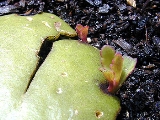
Biological reproduction
Overview
Reproduction is the biological process
by which new "offspring" individual organism
s are produced from their "parents". Reproduction is a fundamental feature of all known life
; each individual organism exists as the result of reproduction. The known methods of reproduction are broadly grouped into two main types: sexual
and asexual
.
In asexual reproduction, an individual can reproduce without involvement with another individual of that species.
Biological process
A biological process is a process of a living organism. Biological processes are made up of any number of chemical reactions or other events that results in a transformation....
by which new "offspring" individual organism
Organism
In biology, an organism is any contiguous living system . In at least some form, all organisms are capable of response to stimuli, reproduction, growth and development, and maintenance of homoeostasis as a stable whole.An organism may either be unicellular or, as in the case of humans, comprise...
s are produced from their "parents". Reproduction is a fundamental feature of all known life
Life
Life is a characteristic that distinguishes objects that have signaling and self-sustaining processes from those that do not, either because such functions have ceased , or else because they lack such functions and are classified as inanimate...
; each individual organism exists as the result of reproduction. The known methods of reproduction are broadly grouped into two main types: sexual
Sexual reproduction
Sexual reproduction is the creation of a new organism by combining the genetic material of two organisms. There are two main processes during sexual reproduction; they are: meiosis, involving the halving of the number of chromosomes; and fertilization, involving the fusion of two gametes and the...
and asexual
Asexual reproduction
Asexual reproduction is a mode of reproduction by which offspring arise from a single parent, and inherit the genes of that parent only, it is reproduction which does not involve meiosis, ploidy reduction, or fertilization. A more stringent definition is agamogenesis which is reproduction without...
.
In asexual reproduction, an individual can reproduce without involvement with another individual of that species.

